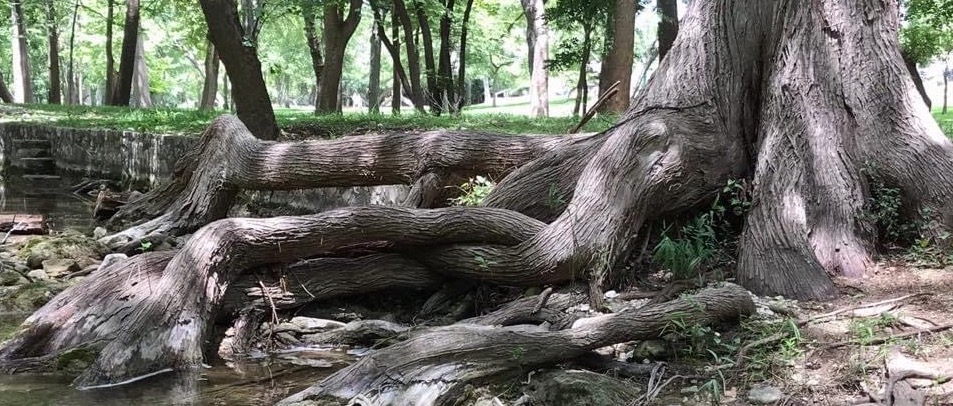
Here in Central Texas, I get to see some truly inspiring roots. Beside a creek in Wimberley, the roots of cypress trees dip right into pools of water, wander along the bank, and cross the stream. They live an extravagant life, well nourished and rarely wanting, creating a tall canopy above. Closer to home in higher, drier soil, scrubby trees send roots through harsh, rocky terrain seeking their source of water far beneath the surface.
More broadly, I’ve seen a particular species of tree grow differently depending on location. Live oaks in Houston are tall and broad with shallow roots because water is abundant and close to the surface – I’ve seen them topple in high winds, taking all their roots with them. Those same trees in Austin are shorter and skinny with roots that travel through layers of limestone to find water. Nothing uproots them.
When we humans compare ourselves to trees, it is often with the idea that our roots give us special qualities, physical and intellectual traits that are passed on through generations of mothers and fathers, aunts and uncles. No matter how far apart our familial branches, we are connected to a root that anchors us in the soil of kinship.
Roots don’t just anchor trees – or families – however. In a more important way, they are vessels for the water and nutrients that sustain the tree. Leaves. branches, trunk, roots, and all. And so if we take the root metaphor another step we might ask, if our family roots anchor us, how and with what do they feed us? What is the equivalent of water and minerals that flow through our generations to sustain us?
I know for my family, my roots, the water that feeds us has been our religious faith. There have been some toxins in the water – alcoholism, illness, estrangement – and those, too, affect the way our family tree has grown. Other families might be watered by ethics and philosophy, common struggle, or connection to the land. Their soil might be tainted with toxins of abuse, pride, violence, or oppression.
There are some families whose roots carry water, easily; they are anchored near the source of the water and get a constant flow of nutrients. It sometimes happens in these parts of Texas and in some families that the stream dries up. Lack of rain deprives their roots of the sustenance that used to be so accessible. Or the water is tainted and becomes a poison – in which case the tree’s (or family’s) very structure becomes the vehicle for its demise.
Other families look like they are struggling on the surface. And yet they survive through months and years of arid existence. Their roots work hard to seek sustenance, even when it is covered by layers of hard experience and a harsh environment.
Like trees, we can’t really just uproot and be someone, something else. But we are not actually trees, and we can tend to the source of our nourishment, the life-giving substances that travel through our roots to feed us. We can also share our water, our sustenance with others. For humans, the creek never really runs dry, but sometimes it is prevented from flowing freely.
No matter who the members of your family tree are, no matter how deep or broad your roots stretch, you are sustained by spiritual water that is not of your making or your make up. It’s good to know your roots, and also good to know that the roots of everyone else’s family tree serve the same noble purpose as yours – to nourish them.
Ok, longer than that, but in a particular way recently.
** As the inimitable Becca Stevens reminds us, God doesn’t make weeds, only people do that.
*** We call them cedars, but they aren’t. Perhaps another aspect of this root metaphor?

